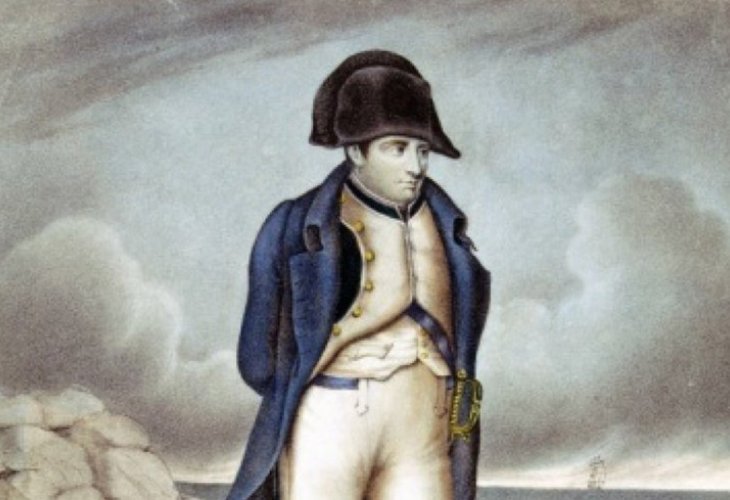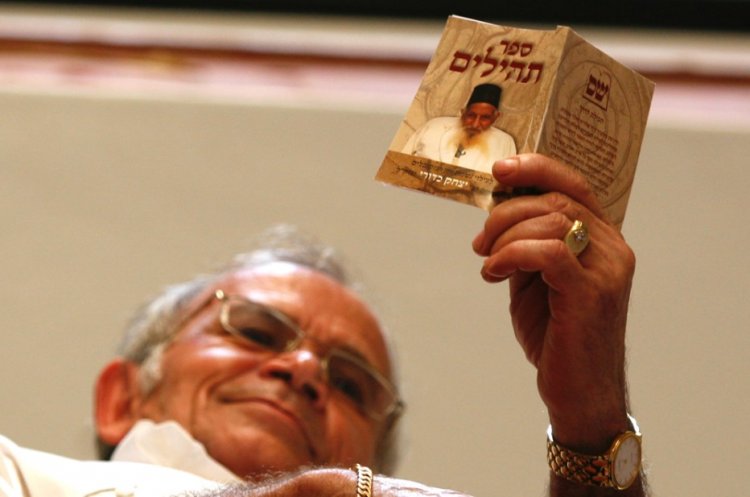Facts in Judaism
Five Minutes to Eternity: A Lesson for Parshat Mikeitz
Pharaoh’s Dream, a Crying Sage, and a Distracted Soldier Teach Us About Life’s Greatest Opportunities

Rabbi Yisrael Meir Shushan is known for his heart-stirring sermons. In his weekly talk for the 'Dirshu' website, Rabbi Shushan presented a wonderful interpretation of the weekly Torah portion (Parshat Mikeitz):
"Parshat Mikeitz tells about Pharaoh's dreams – the dream of the cows and the dream of the ears of grain," Rabbi Shushan begins. "Joseph interprets these dreams for him: seven years of plenty are about to come upon Egypt, years in which Egypt will lack nothing at all. These will be followed by seven years so barren that the years of plenty will not be remembered."
After interpreting the dream, Joseph provides a solution to the problem and explains to Pharaoh how to prepare for the years of famine. "Pharaoh, be prepared and get ready: during the seven years of plenty, appoint someone to gather food and reduce food distribution. If every bakery normally receives a ton of flour per day, reduce it to 400 kilograms and put the remaining 600 in storage... This way, when the years of famine arrive, there will be enough food reserves for the public." This is Joseph's advice.
Rabbi Shushan quoted a question raised by the late Rabbi Eliyahu Lopian: Joseph suggested appointing a 'discerning and wise man' as the manager. But why are these qualities necessary? Seemingly, a good warehouse manager with law enforcement officials could do a fine job and prevent excess food distribution. Why place an emphasis on discernment and wisdom?
Rabbi Lopian explained that during the years of plenty, people become blinded by the abundance. Seeing the enormous quantities of food arriving at bakeries and pastry shops, it became difficult to imagine the years of famine. People started pressuring the manager: 'Don't reduce my usual amount so drastically, reduce it less...'
For this reason," explained Rabbi Lopian, "it was necessary to appoint a wise man. In Pirkei Avot, we are taught: 'Who is wise? One who foresees the consequences.' Only someone who can visualize in his mind's eye a hungry child begging his mother: 'Mommy, please give me a piece of bread!' and the desperate mother answering with tears: 'There isn't any, I have nothing to give you!' Only such a person won't be blinded by abundance, and can manage the food distribution and storage.
Rabbi Shushan continued, and explained that Rabbi Lopian's answer contains a great moral lesson for people living in this world: "A person comes to this world for seventy or eighty years, maximum one hundred and twenty years," Rabbi Shushan reminded us. "During his years of plenty, during his lifetime on earth, he has the opportunity to store vast amounts of spiritual food – mitzvot, Mishnah study, learning, and more.
"But when he reaches the World of Truth, the years of plenty end, and he can only exist on what he managed to store. A person will arrive in the World to Come and tear his hair out: 'Oh, what a fool I was, could I not have recited a few chapters of Tehillim while walking to the synagogue? Could I not have used that time to learn another chapter of Mishnah...?' How much we will regret every blessing we could have recited with greater intention, and every opportunity we didn't properly utilize," Rabbi Shushan called out from the depths of his heart.

"I want to share with you a story, the final story about the Vilna Gaon," continued Rabbi Shushan. "In his final days, the Vilna Gaon lay on his deathbed. His students and members of the Chevra Kadisha (burial society) were already around him. Suddenly, everyone saw tears flowing from his eyes. One of his students, feeling that these were the last moments of learning from his teacher, approached and asked: 'Why is our Rabbi crying? What is there for the Rabbi to seek here in this world? Soon our teacher will arrive in Heaven, in the heavenly academy with Rabbi Shimon bar Yochai, with all the Tannaim, what does the Rabbi have in this lowly world?'" the student asked his great teacher.
The Gaon, with his remaining strength, lifted his tzitzit and said with pain: "How much do tzitzit cost? A few pennies. For a few pennies, one can purchase a mitzvah that is equal to all the commandments combined. Every second a person wears tzitzit, it's as if he fulfilled all the commandments... Soon, I'll no longer have the opportunity to fulfill the mitzvah of tzitzit. In heaven, there are no tzitzit, no blessing, no 'Yehei Shmei Rabba' ('May His Name be great,' the refrain answered in Kaddish). There is no possibility to fulfill mitzvot in the World of Truth! This is why I cry! How can one leave such a precious world, where with a few pennies one can earn eternal life?!"
"Unfortunately, we spend our days here fast asleep, God forbid," Rabbi Shushan called out in pain. "We don't utilize the opportunities that lie at our feet."
Rabbi Shushan shared another story: "About 200 years ago, the mighty French Emperor Napoleon conquered many countries. During the bloody war, an enemy nation managed to inflict heavy casualties on him. The defeated Napoleon stood helpless, his soldiers were falling one after another, and the failure on the frontlines was crushing.
"Napoleon called his military minister and instructed him: 'Tell the soldiers on the front that any soldier who fights with all his might and gives his life to save the empire – will receive a reward unlike any ever given!' This dramatic news was passed among the soldiers, who tried with all their might to fight to their last drop of blood. Indeed, the battle results did not disappoint. More and more enemy battalions were defeated, and Napoleon returned to his conquering position as before. The commander who led the battle to victory was honorably brought before Napoleon, and the legendary emperor embraced and kissed him and, as promised, gave him a gift that had never been given to any person before.
Now came the time for the legendary reward. "I have a treasure," said Napoleon. "The royal treasury, which is hundreds of years old. Gold, diamonds, precious stones, and pearls. In thirty days, I invite you to enter the royal treasury room for five full minutes and take from it whatever your heart desires!"
The commander was filled with great excitement: he was going to become one of the wealthiest men on earth. For five minutes, he would be in the treasury, where each second he could grab handfuls of precious diamonds. A five-minute stay in the royal treasury was a priceless opportunity.
Two days after making the promise, Napoleon regretted his generous offer. "What have I done? How could I invite him to enter my treasure room?! Five minutes is a lot of time – he could amass a huge fortune for himself. I could have given him a large sum... what have I done?!"
But what's done cannot be undone. It would not befit a king to go back on his word. The king called his advisors, shared the problem with them, and consulted with them about the most effective method of damage control.
"Your Majesty," called one of his wise men, "don't worry, I have a wonderful idea! Let's send our people to check what the soldier loves, what impresses him, and we'll distract him with external stimuli... and in this way, slowly, the precious five minutes will pass and the damage will be reduced." Messengers were sent to track the man and ascertain what would sway his heart. To their delight, they discovered that he loved music very much; his heart was drawn to melodies. The king prepared a special and beautiful orchestra of nine musicians in the treasure room, and it was decided that every half minute, more and more musicians would join the unique orchestra, to distract the soldier and persuade him to stand and enjoy the beautiful music instead of collecting precious treasures.
The fortunate winner, who did not know what was planned for him, had already ordered furniture, a new house, clothes, and so many other things with unlimited credit. Everyone knew that in a few days he would be among the richest in the land and agreed to sell him whatever his heart desired.
The special day arrived. A respectable carriage from the royal palace came to his house to bring him to the palace. And so, equipped with large sacks, he arrived at the palace with a pounding heart. As soon as he entered the treasure room, a beautiful philharmonic orchestra awaited him, immediately breaking into a wonderful melody. The special tune and the mighty orchestra completely paralyzed him. He was unable to take even one small step. Mesmerized, he stared at the musicians playing vigorously.
He looked at his watch, oh no! Half a minute had passed. He tried to walk, moved one leg, and suddenly six new musicians began to play, a special and wonderful tune unlike anything he had ever heard. He stood enchanted by the rare music that reached his ears, and slowly time passed without him noticing, and he forgot where he was.
Suddenly, one of the king's men arrived, grabbed him by the neck, and said firmly: "Sir, your time is up, the five minutes have ended. You must leave immediately!"
The unfortunate man left in despair and burst into bitter tears: "Oh, how foolish I am! I was given five full minutes, and I left empty-handed! If I had taken even one handful of diamonds, I could have enjoyed a magnificent orchestra my entire life!! Woe is to me, I wasted the entire treasure on trivialities."
Rabbi Shushan concluded the story: "This story is also a parable for this world. This world is like five minutes compared to the World to Come. What are 120 years compared to the eternal life awaiting us?! When we arrive there, we will burst with regret for every moment we didn't study Torah, for every blessing we didn't recite properly. The feeling of missed opportunity for every mitzvah we squandered will accompany us when we come to the World of Truth."
The conclusion is clear: Joseph suggested to Pharaoh to appoint a discerning and wise man. "Let us also be wise and foresee the consequences, let us seize another mitzvah, another act of kindness, another kind word to others, a chapter of Mishnah, and then we will merit to live life, to use it, to transform it from a material moment to an eternal moment," Rabbi Shushan concluded.
Courtesy of the 'Dirshu' website

